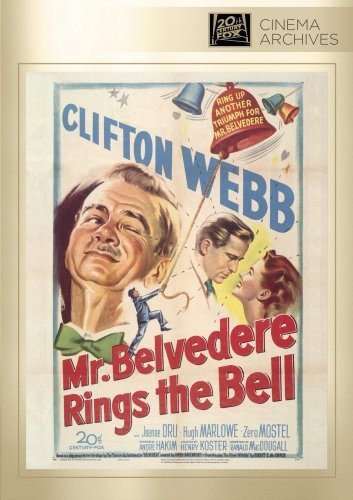
Written by Brandie Ashe
“He seemed like such a nice man—real pleasant! Then it turns out he’s a writer.”
The character of Lynn Belvedere is perhaps best known to modern audiences as the know-it-all English butler (played by Christopher Hewitt) who becomes a confidant and counselor for an uncouth Pittsburgh family in the 1980s sitcom Mr. Belvedere. But before he ever appeared on the Owens family doorstep, Mr. Belvedere debuted on the big screen in the 1948 film Sitting Pretty, in which the character, a super-intelligent man-of-the-world, takes a job as a babysitter for suburban couple Robert Young and Maureen O’Hara, so as to make a case study of their small neighborhood, which is veritably teeming with secrets (all of which he then reveals in a thinly-veiled, bestselling satirical novel, much to the chagrin of the residents). As played by Clifton Webb (who was nominated for an Academy Award for Best Actor for the role), Belvedere is wry and sardonic, intelligent, quick-witted, and quick to comment on any given situation. The Belvedere character led to two cinematic sequels: 1949’s Mr. Belvedere Goes to College, in which he appeared opposite a teenaged Shirley Temple; and Mr. Belvedere Rings the Bell (1951), the character’s cinematic swan song.
n that final film, the all-knowing writer decides to abandon a planned series of cross-country lectures in order to make a depressed group of elderly nursing-home residents feel young again. By ditching his stressed-out manager, Emmett Wilson (Zero Mostel), and taking advantage of a case of mistaken identity, Belvedere (a dapper man of 46) is able to pass for a very youthful-looking 77-year-old man named Mr. Erwenter. He becomes a resident of the Church of John Home for the Aged, and though his presence raises the suspicions of dedicated but preoccupied Reverend Charles Watson (Hugh Marlowe), “Erwenter” inspires the various residents to feel young and free once more. In the process, Mr. Belvedere also teaches Reverend Watson and his young love, nurse Harriet (Joanne Dru), a little lesson about living life to the fullest as well.
While the character of Mr. Belvedere is based on a 1947 novel by Gwen Davenport, the sequels are not derived from the author’s original work. Bell is actually based on Robert MacEnroe’s The Silver Whistle (1948), a play centered on an entirely different character. The play was rewritten with Belvedere in the lead role to capitalize on the character’s immense popularity with audiences. Still, the movie was not as well-received as the original or the first sequel; the ever-fussy New York Times critic Bosley Crowther bemoans “something disturbingly fishy” about Mr. Belvedere’s new “Pollyanna role” in his 1951 review of the film. Not to say that Crowther doesn’t have a point; this version of Belvedere is rather warm-and-fuzzier and less sarcastic than his previous incarnations (though that sharp tongue is still put to good use at times). But Webb is nonetheless as charming as ever, and his interactions with Mostel are some of the more enjoyable moments of the film. And he’s helped greatly by an engaging supporting cast of “old coots,” many of whom appeared in MacEnroe’s original Broadway play and are universally endearing here (with the undisputed standout performance coming from the hilarious Doro Merande). And let’s not forget the lovely pair of Marlowe and Dru; while Marlowe is saddled with perhaps the most thankless character in the film, the sometimes underrated Dru coming across as particularly winning.
Mr. Belvedere Rings the Bell has recently been released with a number of other titles on MOD (Manufactured on Demand) DVD through Fox Cinema Archives. The MOD format is notoriously problematic in regards to lack of extras and features and dubious transfer quality, and this film is no exception to that sad rule: the DVD has zero special features, and it evens lacks the ability to select chapters (though the menu screen helpfully instructs one to use the fast-forward and rewind buttons to skip through the film at 10-minute intervals should the need arise). Worse still, the transfer is middling, at best; some parts are so starkly white that the characters blend confusingly into the background.
But don’t let the technical issues scare you away from watching this film, because it is a delightful (albeit admittedly minor) comedy and definitely worth your time, particularly if you are an avowed Belvedere fan. Thanks to some crisply composed dialogue, an entertaining story, and some charming performances, Mr. Belvedere Rings the Bell is quite an amusing ride.